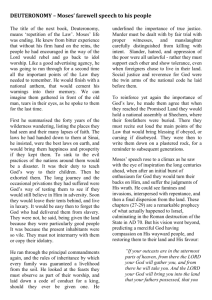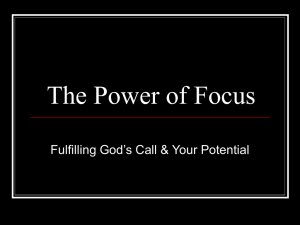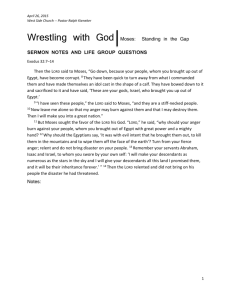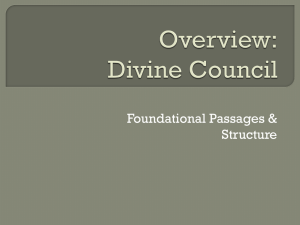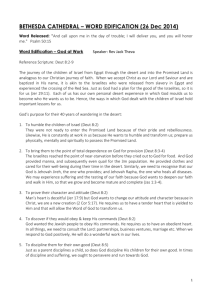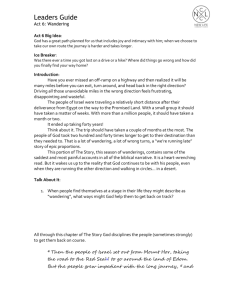Shabbat Table Talk for Devarim
advertisement
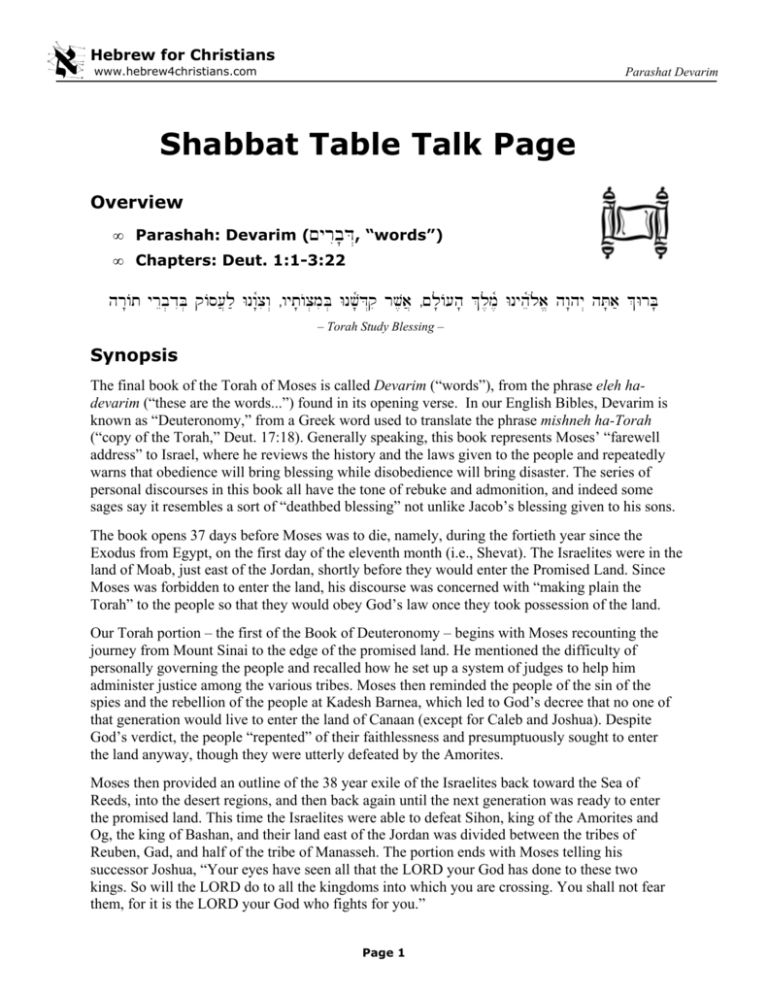
Hebrew for Christians
www.hebrew4christians.com
Parashat Devarim
Shabbat Table Talk Page
Overview
•
Parashah: Devarim (~yrIb'D>, “words”)
•
Chapters: Deut. 1:1-3:22
hr"At yrEb.dIB. qAs[]l; Wnw"òciw> Ãwyt'wOc.miB. Wnv'ñD>qi rv,a] Ã~l'A[h' %l,mñ, Wnyheñl{a/ hw"hy> hT'a; %WrB'
– Torah Study Blessing –
Synopsis
The final book of the Torah of Moses is called Devarim (“words”), from the phrase eleh hadevarim (“these are the words...”) found in its opening verse. In our English Bibles, Devarim is
known as “Deuteronomy,” from a Greek word used to translate the phrase mishneh ha-Torah
(“copy of the Torah,” Deut. 17:18). Generally speaking, this book represents Moses’ “farewell
address” to Israel, where he reviews the history and the laws given to the people and repeatedly
warns that obedience will bring blessing while disobedience will bring disaster. The series of
personal discourses in this book all have the tone of rebuke and admonition, and indeed some
sages say it resembles a sort of “deathbed blessing” not unlike Jacob’s blessing given to his sons.
The book opens 37 days before Moses was to die, namely, during the fortieth year since the
Exodus from Egypt, on the first day of the eleventh month (i.e., Shevat). The Israelites were in the
land of Moab, just east of the Jordan, shortly before they would enter the Promised Land. Since
Moses was forbidden to enter the land, his discourse was concerned with “making plain the
Torah” to the people so that they would obey God’s law once they took possession of the land.
Our Torah portion – the first of the Book of Deuteronomy – begins with Moses recounting the
journey from Mount Sinai to the edge of the promised land. He mentioned the difficulty of
personally governing the people and recalled how he set up a system of judges to help him
administer justice among the various tribes. Moses then reminded the people of the sin of the
spies and the rebellion of the people at Kadesh Barnea, which led to God’s decree that no one of
that generation would live to enter the land of Canaan (except for Caleb and Joshua). Despite
God’s verdict, the people “repented” of their faithlessness and presumptuously sought to enter
the land anyway, though they were utterly defeated by the Amorites.
Moses then provided an outline of the 38 year exile of the Israelites back toward the Sea of
Reeds, into the desert regions, and then back again until the next generation was ready to enter
the promised land. This time the Israelites were able to defeat Sihon, king of the Amorites and
Og, the king of Bashan, and their land east of the Jordan was divided between the tribes of
Reuben, Gad, and half of the tribe of Manasseh. The portion ends with Moses telling his
successor Joshua, “Your eyes have seen all that the LORD your God has done to these two
kings. So will the LORD do to all the kingdoms into which you are crossing. You shall not fear
them, for it is the LORD your God who fights for you.”
Page 1
Hebrew for Christians
www.hebrew4christians.com
Parashat Devarim
Parashah Questions
1.
What does the word devarim mean? (Deut. 1:1) 1
2.
What does the word “deuteronomy” mean? 2
3.
To whom did Moses deliver his speech? 3
4.
How long after Moses’ speech was it before Joshua led Israel across the Jordan? 4
5.
Where did Moses deliver his speech? 5
6.
What was the point of Moses’ speech (Deut. 1:5)? 6
7.
Why does Moses say it takes 11 days to go from Horeb by way of Mount Seir to
reach Kadesh Barnea (Deut. 1:2)? 7
8.
On which holiday did Moses begin his speech, and in which year (Deut. 1:3)? 8
9.
Who were the “Amorites” (Deut. 1:4)? 9
10.
The Israelites “devoted to destruction” every city – including men, women, and
children – of which two Amorite kings? 10
11.
What does the word “Horeb” (brExo) mean (Deut. 1:6)? 11
1
2
3
4
5
6
7
8
9
10
11
The word devarim means “words,” the plural of davar, “word, thing.” In the context of this book, devarim refers to
the terms of the covenant with God, as well as to Ten Commandments and other regulations of the Torah (hr"ATh;).
“Second law,” from the Greek word deuterono,mion used to translate hr"ATh; hnEv.mi in Deut. 17:18.
To “all Israel” (laer"f.yI-lK'-la,), though since there were over 600,000 men over the age of twenty, not including the
number of their families, this term most likely meant to the representatives of the nation (i.e., the elders).
Joshua began the conquest of Canaan after Passover (Josh 5:10-ff.), so Moses’ speech, death, and succession all took
place within two and a half months. Moses turned 120 years old when he gave this speech (Deut. 31:2).
East of the Jordan River in the Aravah, a desert region north of the Dead Sea, sometimes called the “plains of Moab.”
Note that the other place names (mentioned in verse 1) are regarded as “code” for rebuke to Israel by the sages.
“Moses undertook to explain (raeBe) this law.” Notice that the verb translated “explain” is used only twice in the Torah
(Deut. 1;5; 27:8), and its root word means a well (raeB.) of water. His speech was intended to draw water from the well
of his experience to share with others.
Israel was to begin the conquest from the south, from Kadesh Barnea, not from the east at Jericho. Mentioning the 11
days is meant to contrast the 40 years of wandering that resulted from Israel’s rebellion at Kadesh (Num. 14:34).
On Rosh Chodesh (Shevat) of the 40th year after the Exodus (i.e., Jan./Feb. in the Gregorian calendar).
The Amorites were descendants of Noah’s son Ham (i.e., the 4th son of Canaan: Gen. 10:16). Later they became a
nomadic people of Mesopotamia who eventually founded Babylon. They are regarded as one of the “seven Canaanite
nations” who were marked to be destroyed from the land (Exod. 34:11-12; Deut. 7:1; 20:17-18; Acts 13:17-19). The
Amorites are also identified as generic “Canaanites” (Num. 14:43; cp. Deut. 1:44) and therefore were “squatters”
who had to be removed from the land given by God to Israel.
Sihon, who lived in Heshbon, and Og, who lived in Bashan. They were nephillim (giants) who were brothers. Og is
described as a rephaite giant who required an iron bed (3:11).
Horeb means “dried up ruins” or “desolate place” and is a synonym for Mount Sinai.
Page 2
Hebrew for Christians
www.hebrew4christians.com
Parashat Devarim
12. Did God originally intend to give all the land promised to Abraham (Deut. 1:7)? 12
13. When Moses said the people were a burden for him, what did he do (Deut. 1:9-17)? 13
14. What was the blessing Moses gave to Israel (Deut. 1:11)? 14
15. Can you explain the role of the judges Moses appointed (Deut. 1:16-17)? 15
16. What if the judges could not determine the outcome of a particular case? 16
17. God led the people directly from Sinai to Kadesh Barnea to begin taking possession
of the land from the south. But what happened there (Deut. 1:19-40)? 17
18. What did Moses say to encourage the people to keep faith (Deut. 1:29-31)? 18
19. Why did Moses say that God denied his request to enter the land as a result of the
people’s unbelief at Kadesh Barnea, when earlier we learn this decree came from
striking the rock at Meribah (Deut. 1:37; cp. Num. 20:2-12)? 19
20. How long were the Israelites camped at Kadesh Barnea (Deut. 1:46)? 20
21. When the camp of Israel began to move from Kadesh Barnea, why did God forbid
them from attacking the Kingdom of Edom (Deut. 2:1-7)? 21
22. Why did God forbid war with the Kingdom of Moab (Deut. 2:8-9)? 22
12
13
14
15
16
17
18
19
20
21
22
Yes, “to the great river Euphrates,” though after the sin of the spies God appears to have restricted the inheritance to
the land of Canaan. Compare Gen. 15:18-21; 26:3, Exod. 23:31, Num. 35:1-15, Deut. 1:6-8. See also Rom. 4:13.
He appointed judges to rule over groups of people (1000’s, 100’s, etc.). Compare with Exod. 18:14-27).
That the LORD God would bless them and that they should be “1,000 times as many as you are.”
They must hear the cases between others and render a righteous verdict. They must not be subject to bribery or be
influenced by social status. The Hebrew phrase lo takiru fanim ba-mishpat (jP'v.MiB; ~ynIp' WryKit;-al{, “do not regard
faces in judgment”) is an idiom that means to be impartial. Moses repeats the warning: “you shall not be afraid of the
faces of any man” (vyai-ynEP.mi WrWgt' al{) because the judgment is from God (aWh ~yhil{ale jP'v.Mih; yKi).
They were instructed to escalate difficult cases to Moses, who would then appeal to God for the verdict.
The “sin of the spies” and the revolt of the people who refused to believe that God would give them the land. This
account in Deuteronomy is presented differently than that of Numbers 13.
Moses told them that God would fight for them, just as He did in Egypt, and he reminded them how the LORD had
carried the people, “as a man carries his son” (AnB.-ta, vyai-af'yI rv,a]K;) through the desert to reach this very place.
Moreover, he reminded them that the LORD had gone before them “in fire by night and in the cloud by day, to show
you by what way you should go” (Deut. 1:30-33).
Apparently Moses continued to ask that God’s decree be annulled, but after the sin of the spies, Moses was included
among those who would die in the desert.
Kadesh Barnea became the site of Israel’s galut (exile) for 38 years....
The Edomites were descendants of Israel’s brother Esau, and the land surrounding Mount Seir had been given to
Esau and his descendants by God as an inheritance. God provided for Israel and did not need Edom’s help (2:7).
The Moabites were descendants of Lot’s son Moab from his oldest daughter (Mo’ab means “from av - father”) who
were given the land of Ar an inheritance and from whom Ruth, the great-grandmother of King David, would come.
Page 3
Hebrew for Christians
www.hebrew4christians.com
Parashat Devarim
23. Why did God forbid war with the Kingdom of Ammon? (Deut. 2:19)? 23
24. What is significant about the “brook of Zered” (Deut. 2:13-16)? 24
25. Why did Moses offer terms of peace to king Sihon, when God instructed the
Amorites to be removed from the land (Deut. 2:24-29)? 25
26. What happened to Sihon’s kingdom (Deut. 2:30-35)? 26
27. Why did the king of Bashan attack Israel (Deut. 3:1-2)? 27
28. What tribe received the land of Bashan (Deut. 3:13)? 28
29. What did Moses say to the tribes that settled east of the Jordan (Deut. 3:18-20)? 29
30. What did Moses say to encourage Joshua regarding the future (Deut. 3:21-22)? 30
The Amorites were regarded as
one of the “seven Canaanite
nations” marked to be destroyed
from the land (see Exod. 34:1112; Deut. 7:1; 20:17-18; Acts
13:17-19). On the other hand,
during the time of the conquest
the three kingdoms of Edom,
Moab, and Ammon were “off
limits” to Israel...
23
24
25
26
27
28
29
30
The Ammonites were descendants of Lot’s second son Ben-Ammi (from his youngest daughter) through whom
would come Na’ama, who married King Solomon and bore his successor, King Rehoboam.
It symbolically divided the desert generation that had died off at Kadesh Barnea during the previous 38 years from
the new generation that was going to take possession of the land.
Moses offered terms of peace but God understood they would be rejected when Sihon’s heart was hardened (2:30).
The language used to describe Sihon is the same regarding the hardening of Pharaoh’s heart (Exod. 7:3).
The populations of his cities and towns were placed under cherem, that is, completely annihilated (2:34). Only
livestock and other spoils of war were spared. Later this land was given to the tribes of Reuben and Gad.
Og, the king of Bashan, was a half-brother of Sihon.
The half-tribe of Manasseh received the entire kingdom of Bashan with its 60 cities (Deut. 3:4).
He commanded the warriors from the tribes of Reuben, Gad, and Manasseh to join the other 9 1/2 tribes when they
made their military incursions into the land of Canaan.
Moses told him that God would help him destroy the seven Canaanite nations just as God destroyed the Amorites.
Page 4
Hebrew for Christians
www.hebrew4christians.com
Parashat Devarim
Discussion Topics
1.
The familiar expression of the Torah, “and the LORD spoke to Moses,” is replaced
by “These are the words that Moses spoke to all Israel...” in Deuteronomy. What
significance is there to Moses retelling the Torah through his own eyes?
2.
Discuss why this portion is always read on the Sabbath before Tishah B’Av.
3.
Regarding the resemblance between the word “devarim” (words) and “devorim”
(bees) Deuteronomy Rabbah says, “Just as the honey of a bee is sweet and its
sting is sharp, so are the words of the Torah.” Why do you think Moses began his
speech by recounting the “sin of the spies”?
4.
At Sinai Moses established judges over 1000’s, 100’s and so on. These judges
helped interpret the Torah to the people. Do you understand why the “oral law”
(tradition) is foundational to Jewish thinking?
5.
In this portion God commanded the Israelites not to attach Edom, the descendants
of Esau (who lived at Mount Seir). The midrash states that the Israelites were
forbidden to attack them because Esau remained near his father and later
reconciled with Jacob, even refusing to accept Jacob’s gifts of propitiation. Do
you find this a plausible reason for the Torah’s commandment?
6.
Certain incidents written in this portion appear to contradict accounts found
elsewhere in the Torah. For instance, compare:
a.
b.
c.
d.
The establishment of the judicial system (Deut. 1:9-18, cp. Exod. 18:8-27)
Who called for the spying mission (Deut. 1:20-25, cp. Num. 13:1-3)
The account of the report of the spies (Deut. 1:25; cp. Num. 13:27-28)
The description of the defeat of the Israelites after the sin of the spies
(Deut. 1:41-44; Num. 14:40-45)
e. The decree that Moses was unable to enter the land (Deut. 1:35-37, cp.
Num. 20:10-12)
Discuss how each of these incidents may be harmonized or how the different
versions provide additional information or insight. Do you think that Moses’ first
person perspective in Deuteronomy is partly responsible for the differences?
For Next Week:
• Read Parashat Vaetchanan (Deut. 3:23-7:11)
• Read the Haftarah (Isaiah 40:1-26)
• Read the NT (Matt. 23:31-39; Mark 12:28-34)
Page 5
Hebrew for Christians
www.hebrew4christians.com
Parashat Devarim
Haftarah – Shabbat Chazon
Vision of Destruction
The following provides a few thoughts regarding the Haftarah reading
for Shabbat Chazon (i.e., Isa. 1:1-25). The destruction of the Holy
Temple - which Isaiah clearly foresaw long before it happened - is
traditionally mourned on the Jewish fast day of Tishah B’av.
The Sabbath before the holiday of Tishah B’Av is called Shabbat Chazon, the “Sabbath of
Vision,” so named from the opening verse of ithe Haftarah: “Chazon Yeshayahu ven-Amotz,”
(#Ama'-!b, Why"[.v;y> !Azx]), the “Vision of Isaiah, the son of Amoz” (Isa. 1:1). When it was first recorded,
Isaiah’s vision of the destruction of the Temple was still future, and the Jews still had a chance to
repent before the great tragedy befell them. However, since they did not repent, calamity finally
overtook the inhabitants of Judah. During Shabbat services, this portion is traditionally chanted
using the same haunting melody as Megilat Eichah (Lamentations), the acrostic dirge of the
prophet Jeremiah, who was an eyewitness to the destruction and fall of Judah and Jerusalem.
The haftarah opens with the statement, “Hear, O heavens, and listen, O earth, for the LORD has
spoken” (Isa. 1:2). This opening immediately harkens back to Moses’ prophetic song called the
Ha’azinu, though the verbs are reversed. God’s children have rebelled against Him, they have
forgotten the LORD.... They have become “a sinful nation, a people laden with iniquity,
offspring of evildoers, children who deal corruptly! They have forsaken the LORD, they have
despised the Holy One of Israel, they are utterly estranged” (lit. they have become the “tail” or
“hind side” of a brute beast) (Isa. 1:4). Since they have forgotten who they are, God has given
them over to a debased identity: They were once called a “holy nation,” but now they are called a
“sinful nation”; they were once called a “seed blessed by the LORD,” but now they are called a
“sinful seed”; they were once called “children of the Living God,” but now they are called
“children who have become corrupt” (Metzudat David).
God rhetorically asks: “Why will you still be struck down? Why will you continue to rebel? The
whole head is sick, and the whole heart faint. From the sole of the foot even to the head, there is
no soundness in it, but bruises and sores and raw wounds; they are not pressed out or bound up
or softened with oil” (Isa. 1:5-8). The LORD asked why the people were not reflecting upon their
suffering... Samaria had already fallen and the Israelites of the Northern Kingdom had suffered
exile. Parts of Judah had also been overrun, yet none of this made any difference - the people
went on their daily lives acting as if nothing needed to be changed.
Page 6
Hebrew for Christians
www.hebrew4christians.com
Parashat Devarim
What’s the use of chastening if you will not “get the point” of God’s message? God uses
affliction and pain to call you to come closer to Him - to get your attention - but if you refuse to
come to Him for healing and then go on to complain, “Why are we smitten?” you will continue
your rebellion, increasing it more and more. Some wounds are caused from the inner soul - your
“whole head is sick” with mistaken beliefs and your whole heart aches with evil... Therefore you
are sick “from the sole of the foot even to head” - some with open wounds (visible), but others
with bruises (hidden pains). Despite God’s “afflictions of love,” Isaiah foresaw the horrible
outcome of their apostasy: “Your land is desolate and burned down; devoured by foreigners,
overturned before your eyes, and the daughter of Zion is left like ... a besieged city” (Isa. 1:7-8).
Foreseeing further the great exile to come, Isaiah says, “If the LORD of Hosts had not left us a
“surviving remnant,” we should have been like Sodom, and become like Gomorrah (Isa. 1:9).
The prophet then addresses faithless Judah and rebukes the nation for their vain show of
religious observance: “Hear the word of the LORD, you rulers of Sodom! Give ear to the
teaching of our God, you people of Gomorrah! What to me is the multitude of your sacrifices?
says the LORD; I have had enough of burnt offerings of rams and the fat of well-fed beasts; I do
not delight in the blood of bulls, or of lambs, or of goats. When you come to appear before me,
who has required of you this trampling of my courts? Bring no more vain offerings; incense is an
abomination to me. New moon and Sabbath and the calling of convocations - I cannot endure
iniquity and solemn assembly” (Isa. 1:10-13). The syncretism of apostasy is detestable to the
LORD, an insufferable contradiction. “How long will you go limping between two opinions? If
the LORD is the true God, then worship Him, and if the Baal is, then worship him” (1 Kings
18:21). A heart that is indifferent or “lukewarm” toward the LORD invalidates and nullifies
whatever merit religious rituals are thought to afford (Rev. 3:16). As the prophet later said,
“Because this people draw near with their mouth and honor me with their lips, while their hearts
are far from me, and their fear of me is a commandment taught by men, therefore, behold, I will
again do an amazing thing for these people – an absolutely extraordinary thing. Wise men will
have nothing to say, the sages will have no explanations” (Isa. 29:13-14; Matt. 15:8-9; Mark 7:67). Hypocrisy leads to spiritual stultification, a depraved mind that is unable to think correctly.
Regarding the abhorrence of the sacrifices, the LORD is using hyperbole, of course, since He
established the sacrificial system as the means for procuring atonement for the people (the final
expression of which was the glorious sacrifice of the Messiah for our sins, of course). But
sacrificial offerings are of no spiritual significance unless they express a person’s desire to draw
near to the LORD God of Israel. Sacrifices offered without righteousness (i.e., faith: Hab. 2:4)
are meaningless and offensive to God. Indeed, “serving” God by empty rituals is a farce and an
abomination to the LORD... The same can be said regarding observing “new moon” festivals and
the other appointed times of the Jewish calendar (Isa. 1:14). Religious “observance” apart from
the the truth of the Holy Spirit is detestable to God. It is a “burden” to His soul and something
that makes Him “weary...”
Page 7
Hebrew for Christians
www.hebrew4christians.com
Parashat Devarim
Likewise regarding insincere or formulaic prayer: “When you spread out your hands, I will hide
my eyes from you; even though you make many prayers, I will not listen; your hands are full of
blood” (Isa. 1:15). This likely refers to the practice of various “liturgical prayers” - mechanical
recitations said in the assumption they would bring merit - as well as to the Birkat Kohanim, the
“priestly blessing,” when the arms of the priests were outstretched to bless the people. God will
ignore all such insincere petitions and feigned acts of piety. As James later wrote: “You desire
and do not have, so you murder. You covet and cannot obtain, so you fight and quarrel. You do
not have, because you do not ask. You ask and do not receive, because you ask wrongly, to
spend it on your passions. You adulterous people! Do you not know that friendship with the
world is enmity with God? Therefore whoever wishes to be a friend of the world makes himself
an enemy of God” (James 4:3-5).
The LORD calls for inward heart change: “Wash! Purify yourselves! Remove your sinful deeds
from my sight. Stop doing the evil! Learn to do good; seek justice, relieve the oppressed; bring
justice to the fatherless, plead the widow’s cause. Come now, let us reason together, says the
LORD: though your sins are like scarlet, they shall be as white as snow; though they are red like
crimson, they shall become like wool” (Isa. 1:16-18). Isaiah’s call to wash yourself and “purify
your heart” echoes James’ later call: “Cleanse your hands, you sinners, and purify your hearts,
you double-minded” (James 4:8). This is a cleansing of the heart’s intentions, the source of what
moves personal actions and renders decisions. “Learn to do good and pursue justice.” Learn well
the message of God’s heart (Isa. 1:17). Truth is “self-authenticating.” Act according to the truth
and you will know the truth (John 13:17). Do not deceive yourself by merely hearing the
message but not living it out in your daily life (James 1:22).
Notice that the verb translated “reason together” ( ) יָ כַחis related to the word for “reproof,” i.e.,
tochachah. All sound “reasoning” must begin with the foundational truth that people must turn
away from their evil inclinations by returning to God in repentance (i.e., teshuvah). They must
understand moral “cause and effect” and turn away from evil or else suffer the consequences of
their choices (Gal. 6:7). In other words, the LORD is making an argument here and is inviting his
listeners to follow his reasoning. If you turn to Me with all your heart and change your ways,
then you will be cleansed from your guilt and you will find your deliverance... Note further that
the little phrase, “says the LORD” is imperfect tense - the LORD is always saying this and will
continue to do so. Ultimately God is always calling for our heartfelt teshuvah, and no matter how
“scarlet red” our sins might be, this word reveals that the gates of repentance are always open for
those who sincerely desire to draw near to Him for healing.
The phrase, “Come let us reason together” could also be be translated as “Go and argue...” Go,
rather than “come,” suggests that the people should perform cheshbon hanefesh - an “accounting
of the soul” - to better understand why their judgment is coming... The conclusion presents a
logical dilemma: “If you are willing and obedient, you shall eat the good of the land; but if you
Page 8
Hebrew for Christians
www.hebrew4christians.com
Parashat Devarim
refuse and rebel, you shall be eaten by the sword; for the mouth of the LORD has spoken” (Isa.
1:19-20). The verdict had already been reached by God, and now the people were forced to
choose between two alternatives: “eat or be eaten,” partake of God’s goodness or be devoured by
their own evil ways...
The prophet then goes on to lament the fate of Zion. “How (hk'yae) the faithful city has become a
prostitute, she who was full of justice! Righteousness lodged in her, but now murderers. Your
silver has become dross, your best wine mixed with water. Your princes are rebels and
companions of thieves. Everyone loves a bribe and runs after gifts. They do not bring justice to
the fatherless, and the widow’s cause does not come to them. Therefore the Lord declares, the
LORD of hosts, the Mighty One of Israel: “Ah, I will get relief from my enemies and avenge
myself on my foes. I will turn my hand against you and will smelt away your dross as with lye
and remove all your alloy” (Isa. 1:21-24). The judgment that would befall Judah would be a
“refining fire” intended to purify the people and restore God’s purposes for Zion: “Afterward
you shall be called the city of righteousness, the faithful city” (Isa. 1:26).
The prophet Jeremiah, an eyewitness of Isaiah’s vision fulfilled, later proclaimed, “You have
rejected me, declares the LORD; you keep going backward, so I have stretched out my hand
against you and destroyed you - I am weary of relenting. I have winnowed them with a
winnowing fork in the gates of the land; I have bereaved them; I have destroyed my people; they
did not turn from their ways” (Jer. 15:6-7). These words not only apply to the historical fate of
Judah, but they also resound as a warning to all nations that forsake the LORD (Psalm 2:1-5).
“Rebels and sinners shall be broken together, and those who forsake the LORD shall be
consumed” (Isa. 1:28). During the future time of the redemption of Israel, during the Great
Tribulation, “the powerful will be like a thread of yarn, their deeds like a spark; both will burn
together, and no one will put out the fire” (Isa. 1:31).
The redemption of Zion was accomplished by the cross of Yeshua, and all those who repent by
trusting in Him are declared tzaddikim. Nonetheless the promise of Zion remains unfulfilled and
will remain so until the prophesied End of Days. During that time “all Israel will be saved,”
though this will occur after the time of Great Tribulation - a period of time that the destruction of
Judah itself foretold. Time is short for us, chaverim.
May God help us turn to Him b’khol levavkha - with all our hearts.
Page 9

